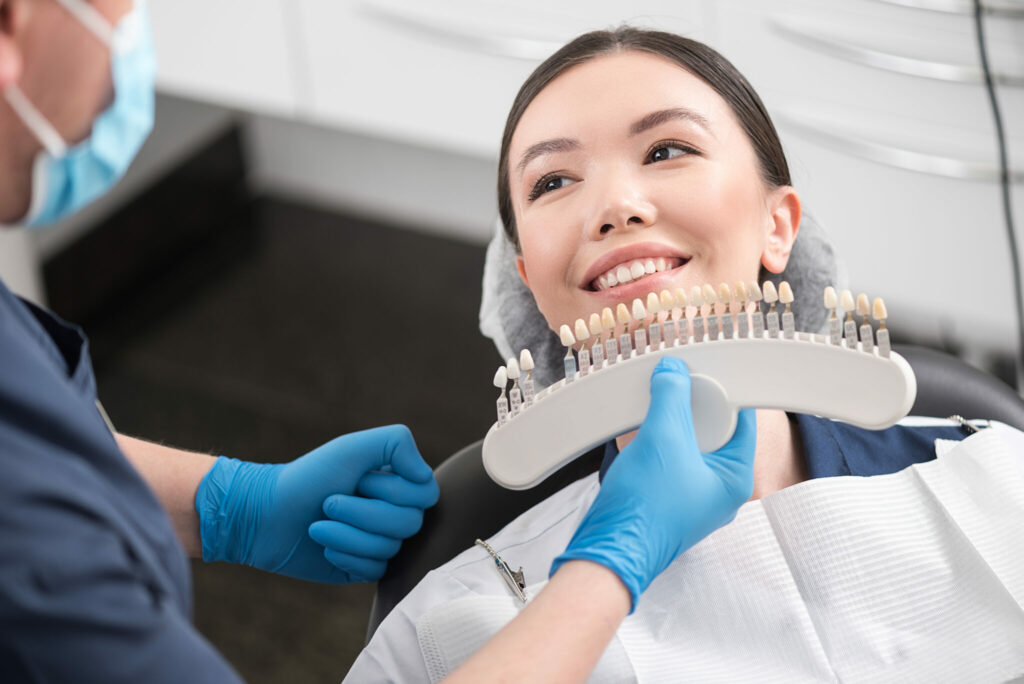Cosmetic Dentistry
Why Cosmetic Dentistry is Worth It
Dentistry is a unique medical science, in that most treatments and procedures are preventative in nature, intended to head off problems before they develop. Regular cleanings and fluoride treatments can go a long way toward helping a patient avoid oral health problems. Cosmetic dentistry may seem at first to be a break with that idea, as cosmetic dentistry focuses on improving the appearance of the patient’s teeth rather than just their health. However, there’s more to cosmetic dentistry than just aesthetics and appearance—cosmetic treatments can improve both the patient’s oral health and their overall well-being.
So what makes cosmetic dentistry worth it?
- Cosmetic dentistry can help boost your confidence, self-esteem, and sense of self-worth. So many first impressions, so much nonverbal communication, so many small interactions depend on a bright, friendly smile. Cosmetic dentistry can help preserve or restore your smile via a number of procedures including tooth whitening, dental veneers, or orthodontic realignment. These treatments, among others, can do a lot for a person’s overall self-image and make interacting with the world less stressful and more enjoyable.
- In addition to the aesthetic benefits, cosmetic dentistry can help repair and prevent problems. It’s not all about looks; correcting misaligned teeth, repairing damaged enamel, or preventing teeth grinding can all help a patient avoid long-term, serious problems that might result from those conditions. Even something as simple as a teeth whitening procedure can make teeth easier to clean even as it improves their appearance.
- In more serious cases, cosmetic dentistry can restore function and allow the patient to re-engage with a number of daily activities their oral health issues may have limited. A good example is a role played by dental implants. Implants are artificial teeth that have been implanted in the jaw and gum and thus function almost exactly like natural teeth. Designed to last a lifetime, they require no more cleaning and maintenance than a natural tooth does. And they can work wonders for a patient’s health and well-being. An implant, or for that matter a bridge or crown, can repair or replace a damaged tooth and allow the patient to eat, speak, and perform other activities that a missing tooth may have curtailed.
- Cosmetic dentistry gives patients control and options. With many possible procedures intended to address a wide variety of issues, cosmetic dentistry gives patients choices regarding their oral health, their appearance, and their future. It’s a powerful tool, impacting many aspects of a patient’s life and well-being. The right cosmetic dental procedure can change life, and that’s not to be discounted.’
To sum up, cosmetic dentistry is about way more than the cosmetic and the aesthetic. It plays a complex role in oral health, both preventing and treating dental issues while improving the lives, careers, and self-confidence of the patients who receive cosmetic dental treatments. At Burgiss DDS, we’ll help you find the right treatment for you, whether it be a cosmetic procedure or something a bit more conventional. Get in touch and make an appointment today and let’s take the next step in advancing your oral health.
Should I Have Teeth Whitening Done or Porcelain Veneers?
In an ideal world, our smiles would remain bright, shiny, and healthy throughout our lifetimes. In practice, teeth become discolored. This is a common issue, affects most adults over the course of their lives, and it can occur for any of a variety of reasons. There’s no reason to be ashamed of discolored teeth, but you may want to correct that condition for professional or personal reasons. So, what’s the best way to go about it?
Two of the most common approaches to correcting discolored teeth are teeth whitening and dental veneers. Both have their advantages, so it will depend on your situation, your overall goals for your appearance and your oral health, and how much time you want to invest in addressing discolored teeth. Let’s learn a bit more about discoloration, what causes it, and what both teeth whitening and veneers have in common.
What Causes Discoloration?
There are a host of potential causes for discolored teeth. If you notice the color of your teeth changing, particularly changing suddenly or unexpectedly, you should consult your dentist for an exam to address the issue. In general, some of the more common causes of discoloration are:
- Food and drink are the most likely culprit for most people. Some foods are prone to staining teeth an off-color; red wine, coffee, and colas/sodas are common causes of discolored teeth. Some fruits and vegetables can do the same, as can some chocolates and candies.
- Tobacco use is bad for all aspects of health, particularly oral health, and it is a prime cause of discolored teeth. Both smoking and chewing tobacco can discolor the teeth.
- Poor dental hygiene is another problem that may lead to discolored teeth. Without regular and effective brushing and flossing–combined with a good diet and regular dental exams and cleanings–your teeth will likely become discolored or yellowed.
- Some medical conditions can lead to discolored teeth. Some diseases may cause the tooth to become yellowed. Some medical treatments, including certain medications, radiation treatments, and chemotherapy, may lead to discoloration. Your doctor and dentist can tell you more about how this may affect you.
- Genetics and aging may also be to blame. Some of us are just more prone to discolored teeth. Likewise, teeth may naturally yellow as we get older.
Teeth Whitening vs Dental Veneers
Teeth whitening and dental veneers work differently in how they correct discolored teeth. Let’s take a look at teeth whitening first.
Teeth whitening works by using a chemical agent to bleach the teeth to the desired color and shine. As with laundry bleach, the chemicals used in teeth whitening treatments work by removing stains and discolorations. Generally, this can be accomplished in one dentist visit. Your dentist will apply the whitening agent to your teeth, let it sit for the appropriate amount of time, and then remove it and clean your teeth. You’ll be left with nice, shiny, clean teeth. While this is fairly quick and easy, it’s not necessarily a permanent solution. You may need to return to the dentist for whitening treatments periodically.
Dental veneers are a permanent prosthetic solution. As the name suggests, your dentist will craft thin porcelain or ceramic veneer to be affixed to the outer side of the tooth or teeth in question. This is a permanent treatment–the tooth or teeth may need to be reshaped in order to accept the veneer. While the veneer may be colored any way you want and requires no more care than your natural teeth, veneers may involve more than one office visit, are more expensive, and again do involve permanently altering your natural teeth.
So what’s the best choice? That depends on you and your situation–your overall health and overall goals are the key consideration. Your dentist can help you decide by explaining what both teeth whitening and dental veneers will mean for you and then guide you to the right choice. If you’re interested in either teeth whitening or dental veneers, get in touch today and make an appointment! Our experienced and friendly staff will explain both and what you need to know about them.


